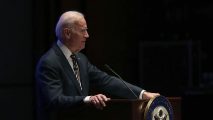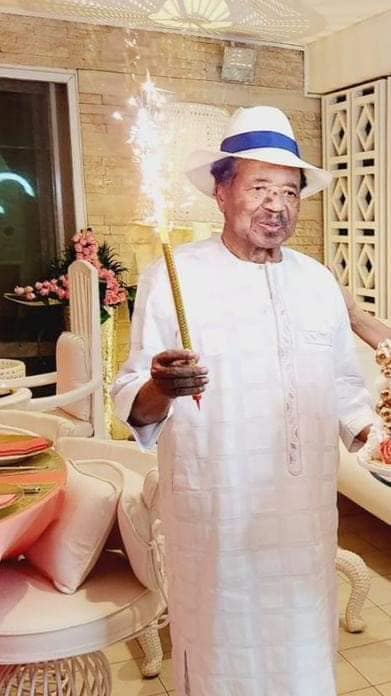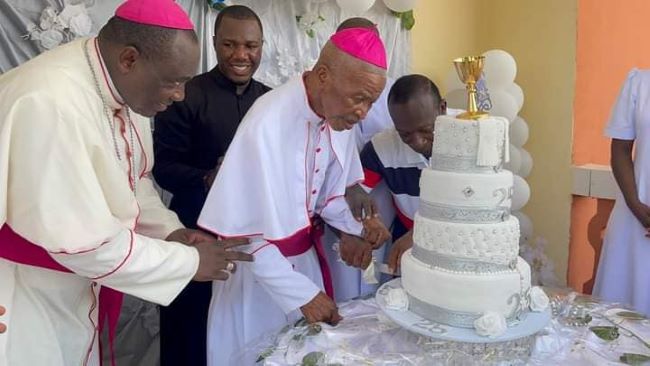Categories
Recent Posts
- Football: Joselu inspires Madrid comeback with ‘heart’ to beat Bayern
- il y avait quoi avant: Camair-Co continues to buckle under debt pile
- FECAFOOT Crisis: Eto’o refuses to sign contract of government-appointed coach
- Manyu Traditional Rulers Association and Mgbe: Wisdom and Knowledge of Jurisdiction is Fundamental
- Hummels stuns Mbappe and PSG to take Dortmund to Champions League final
Archives
- May 2024
- April 2024
- March 2024
- February 2024
- January 2024
- December 2023
- November 2023
- October 2023
- September 2023
- August 2023
- July 2023
- June 2023
- May 2023
- April 2023
- March 2023
- February 2023
- January 2023
- December 2022
- November 2022
- October 2022
- September 2022
- August 2022
- July 2022
- June 2022
- May 2022
- April 2022
- March 2022
- February 2022
- January 2022
- December 2021
- November 2021
- October 2021
- September 2021
- August 2021
- July 2021
- June 2021
- May 2021
- April 2021
- March 2021
- February 2021
- January 2021
- December 2020
- November 2020
- October 2020
- September 2020
- August 2020
- July 2020
- June 2020
- May 2020
- April 2020
- March 2020
- February 2020
- January 2020
- December 2019
- November 2019
- October 2019
- September 2019
- August 2019
- July 2019
- June 2019
- May 2019
- April 2019
- March 2019
- February 2019
- January 2019
- December 2018
- November 2018
- October 2018
- September 2018
- August 2018
- July 2018
- June 2018
- May 2018
- April 2018
- March 2018
- February 2018
- January 2018
- December 2017
- November 2017
- October 2017
- September 2017
- August 2017
- July 2017
- June 2017
- May 2017
- April 2017
- March 2017
- February 2017
- January 2017
- December 2016
- November 2016
- October 2016
- September 2016
- August 2016
- July 2016
- June 2016
Featured
Most Commented Posts
 4 Anglophone detainees killed in Yaounde
4 Anglophone detainees killed in Yaounde
19 comments Chantal Biya says she will return to Cameroon if General Ivo Yenwo, Martin Belinga Eboutou and Ferdinand Ngoh Ngoh are sacked
Chantal Biya says she will return to Cameroon if General Ivo Yenwo, Martin Belinga Eboutou and Ferdinand Ngoh Ngoh are sacked
13 comments Anglophone Nationalism: Barrister Eyambe says “hidden plans are at work”
Anglophone Nationalism: Barrister Eyambe says “hidden plans are at work”
12 comments The Anglophone Problem – When Facts don’t Lie
The Anglophone Problem – When Facts don’t Lie
12 comments Largest wave of arrest by BIR in Bamenda
Largest wave of arrest by BIR in Bamenda
10 comments
Latest Tweets
Featured
-

Football: Joselu inspires Madrid comeback with ‘heart’ to beat Bayern
-

il y avait quoi avant: Camair-Co continues to buckle under debt pile
-

FECAFOOT Crisis: Eto’o refuses to sign contract of government-appointed coach
-

Manyu Traditional Rulers Association and Mgbe: Wisdom and Knowledge of Jurisdiction is Fundamental
-

Hummels stuns Mbappe and PSG to take Dortmund to Champions League final
-

US brands Israel border closures ‘unacceptable’
-

Asylum seekers in UK ‘hide or flee to Ireland’ for fear of deportation to Rwanda
© Cameroon Concord News 2024





30, July 2022
If Ambazonia had no oil, would Macron be in Cameroon? 0
In defining independence strategies around perfect circumstances, war advocates in the NOSO have often been so blinded by their conception of a desirable future as to overlook current shifts in geopolitical dynamics. Internally, Cameroon was able to maintain its military dominance because President Biya was able to use the levers of the state to seize many opportunities on the diplomatic scene. However, his presidency is coming to an end, and with the tectonic shift in world politics resulting from the Ukrainian war, there is an urgent need to debate what kind of geostrategic outcome President Biya’s departure will bring to Cameroon.
As a geostrategist, these questions preoccupy my mind every day. Despite the widespread perception of theories of change due to an inevitable transition, Cameroonians have not yet begun to look at geopolitics or geostrategy in the right light. I chose this sensational title to get your full attention so that we can focus on the boring but critical realities of geopolitics that will affect current and future generations of our countrymen.
Why is Macron in Cameroon?
Macron is in Cameroon because of Ambazonia. He was invited to Cameroon by President Paul Biya, but his primary interest is Ambazonia. Let me explain. Ambazonia was not the main topic in public, but all the analyzes I have done point to Ambazonia.
The reason is simple. The territory referred to as Ambazonia is home to crude oil, which has remained a cornerstone of the French economy since World War II. Ambazonian oil also accounts for nearly 50% of Cameroon’s import revenue each year. African crude oil remains a strategic asset for France and a key pillar in helping France maintain its standard of living over the past 50 years. We Africans have subsidized Europe with cheap exports, especially crude oil. Europe’s reliance on crude oil and gas, however, has only been moderated over the past two decades by Europe’s access to cheap Russian reserves. If Russian supply lines are closed, as Putin is preparing to do, France, like many other European nations, will have no choice but to rely again on African reserves, especially those of the Gulf of Guinea.
Once you realize that Europe needs oil and gas to power its cars and heat its homes in the winter, you have to accept that the last thing a Western leader wants is for people to freeze to death in the winter. . It’s a real suicide.
Oil diplomacy will intensify in the coming months. We are currently preparing the visit of the Russian Minister of Foreign Affairs, Sergey Lavrov, to President Biya, just after that of President Macron.
TotalFinaElf alias TotalEnergies is the world’s 5th largest oil producer with more than 180 billion dollars in revenue for the year 2021, but France does not produce a drop of oil. Central African countries such as Cameroon are the suppliers. In exchange, France offered its support to regimes like Paul Biya, the Bongos in Gabon, the Debys in Chad and Dennis Sassou Nguesso in Congo-Brazza. For decades, this arrangement served France but disrupted the economic structures of these countries. Resource-dependent economies have created oligarchs in Central Africa. Today, thanks to advances in internet communication, the tide is turning. There is growing sentiment against what some Africans see as a neo-colonial framework that creates a small superclass at the expense of millions who live in abject poverty.
Many Cameroonians do not have a sufficient vision of the future. The resulting naivety creates an unreasonable expectation that Macron will defend our interests at his expense. Some even think that he should give up the CFA franc. Others demand that he unblock France’s colonial machine. These results remain improbable without sustained pressure and the levers to make them a reality. Macron may be a liberal democrat, but any world leader is by default a fiscal conservative when it comes to global trade. Every Western leader has taken an oath to defend the interests of his country, militarily and economically. Expecting Macron to drop the CFA or advocate for true liberalization of the Cameroonian economy in relation to world trade is no different from expecting him to come out for independence. Ambazonia. If he has to secure African oil and gas to keep his citizens warm in the winter or to run their cars and machines, he will, no matter what we think. It’s realpolitik.
However, as a serious student of geopolitics, I will also tell you that change is constant. Alliances are not permanent. The future could be very different. As long as oil demand remains strong, global powers will attempt to gain access to Ambazonia oil, and Cameroon’s sovereignty or French access will always be contested.
These external forces are what we often overlook in our political debates. I will therefore take the risk of going where many Cameroonian academics tend to abstain when talking about our oil and gas sector.
The oil industry in Cameroon is very important but remains opaque. According to the World Bank, 47% of all the money Cameroon makes from its exports comes from crude oil, and that crude oil is in Ambazonia. However, we all remember that the World Bank also concluded in January 2011 that only about 46% of the total oil revenues accruing to the government between 1977 and 2006 could be transferred to the budget. Their conclusion that the remaining 54% is not properly accounted for remains the same. If we consider the total amount of oil produced by Cameroon, the figures vary between 70,000 and 100,000 barrels per day. With a barrel of oil at $100 or 64,000 CFA today, this means that Cameroon earns between 6,400,000,000 and 10,000,000,000 CFA per day with oil alone. Without going into accounting details, this means for ordinary mortals that more than 3 billion CFA francs can be diverted per day from the oil account. This fluctuation in the reports also indicates accounting irregularities. What is also problematic is that the Cameroonian government was reporting 185,000 barrels per day in 1984 and no one has ever explained why there was a sudden drop of over 100,000 barrels in the reports after 1984. If these missing 100,000 barrels in declared exports are also a reality, then around 10 billion CFA francs are being siphoned off daily. Cameroonians will therefore want to know who is sucking up this money and where it is going. There are now more tools available for credible investigation by Cameroonian academics and financial experts. The oil debate is one we will have at another time, but these numbers are worth noting to understand the complexity we will have to tackle along the way and the questions that will arise.
TotalFinaElf alias TotalEnergies is the world’s 5th largest oil producer with more than 180 billion dollars in revenue for 2021 alone, but France does not produce a drop of oil. Central African countries such as Cameroon are the suppliers. In exchange, France offered its support to regimes like Paul Biya, the Bongos in Gabon, the Debys in Chad and Dennis Sassou Nguesso in Congo-Brazza. For decades, this arrangement served France but disrupted the economic structures of these countries. Resource-dependent economies have created oligarchs in Central Africa. Today, thanks to advances in internet communication, the tide is turning. There is growing sentiment against what many see as a neo-colonial framework that creates a small superclass at the expense of millions who live in abject poverty.
Many Cameroonians do not have a sufficient vision of the future. The resulting naivety creates an unreasonable expectation that Macron will defend our interests at his expense. Some even think that he should give up the CFA franc. Others demand that he unblock France’s colonial machine. These results remain improbable without sustained pressure and the levers to make them a reality. Macron may be a liberal democrat, but any world leader is by default a fiscal conservative when it comes to global trade. Every Western leader has taken an oath to defend the interests of his country, militarily and economically. Expecting Macron to drop the CFA or advocate for true liberalization of the Cameroonian economy in relation to world trade is no different from expecting him to come out for independence. Ambazonia. If he has to secure African oil and gas to keep his citizens warm in the winter or to run their cars and machines, he will, no matter what we think. It’s realpolitik.
However, as a serious student of geopolitics, I will also tell you that change is constant. Alliances are not permanent. The future could be very different. As long as demand for oil remains strong, global powers will attempt to gain access to Ambazonia oil, and Cameroon’s sovereignty or French access will always be contested.
These external forces are what we often overlook in our political debates. I will therefore take the risk of going where many Cameroonian academics tend to abstain when talking about our oil and gas sector.
Today, Cameroon is a serious victim of the Dutch disease – the curse that afflicts many oil-producing nations. Elf Serepca discovered oil in 1947 off the coast of Southern Cameroons, long before independence. In 1960, Cameroonians, and even President Ahidjo, did not even know that we had oil. After independence, President Ahidjo was made aware of oil, which prompted him to call for the replacement of the Federal Republic by a unitary state. Without a unitary state, he had no basis for a legal claim. When he finally achieved the unitary state through the 1972 referendum, he then proceeded with the land reform of 1974, which made the President of Cameroon the owner of all untitled land throughout the National territory. From 1974 to 1977, President Ahidjo discreetly set up the SNH. The majority of the Cameroonian people only knew that we had oil after the establishment of SONARA. It was not possible to conceal a refinery.
Since 1977, all oil revenues have been controlled exclusively by the Presidency of the Republic. SNH is not an entity accessible to the public. With total control of oil revenues estimated at well over $100 billion since 1977, President Biya has been able to maintain control. As things stand, any president of Cameroon with access to the SNH account can pay the army even if Cameroonians refuse to pay taxes or shut down the economy. This leverage will not be available when Cameroonians start looking at the oil sector.
France benefited from this arrangement, but not as much as many believe today. The situation has changed over the past two decades. Prior to 2002, the French government was a major shareholder in TotalFinaElf, aka TotalEnergies, but had to cede its stake to the European Commission following a ruling by the Court of Justice of the European Communities which condemned the government’s excessive desire Frenchto control the business. As early as 2011, Total Energies began selling or deploying its key assets and operations from Cameroon to Côte d’Ivoire. Since 2009, most oil interests have been held by the Russians, Chinese and British. Companies like New Age Energy, Lukoil and Petrochina have won major concessions. Other Russian companies like Gazprom, Tatneft and Rosneftfaz continue to try to enter the market. It is these companies/competitors that Macron is interested in. His main interest is to obtain more latitude from President Biya. Western powers know that Putin makes money in Cameroon through Lukoil. If Europe is at war with Putin, granting concessions to Lukoil or any other Russian company can be interpreted as an act of hostility towards the West. The French journalist’s question asking President Biya about his position on the war in Ukraine highlights the deep concerns of Western capitals.
You may be wondering why it is important to know this and what is the connection to Ambazonia.
Today, Macron’s official position is that President Biya is an essential ally who will be able to guard and secure the oil assets from Ambas Bay to Bakassi. If President Biya is open to a long-term succession plan, France will probably prefer continuity to change. France will also prefer to support the decentralization programme. Macron will continue to work tirelessly to ensure that the interests of the French people are served. And the best way is to preserve and maintain the status quo.
But this dynamic is also subject to fundamental change if the NOSO war continues.
There is also growing concern in the West about President Biya’s declining mental and physical acuity. Many people have concluded that President Biya has set his sights on the Russians and the Chinese. The signing of the cooperation agreements with Russia is a diplomatic mistake that cemented this view. President Macron has just left Cameroon and Russian Foreign Minister Sergey Lavrov is about to arrive. In recent months, many Western capitals have begun to wonder whether working with Ambazonians will not be a more effective long-term approach to securing the key resources the West needs. If this continues, what if Ambazonians start exploring how to transfer Ambazonian oil interests to the French and Americans? What if Ambazonians come to their senses, put aside anti-French sentiment (which is growing exponentially among French speakers) and give Macron the political and economic dividends he desperately needs? What if Ambazonians choose to sell their oil to France, the United States, or both if the price is right? Can Cameroon survive if the Biya regime is perceived as hostile to the West in the midst of an existential war?
Geopolitics is about to get very complicated, as Putin redoubles his efforts. Ambazonia is in the eye of the storm. The geopolitical and economic importance of the Gulf of Guinea is about to increase. As Europe enters winter and Russian supply lines are closed, this is a time when Cameroon must rethink its strategic position. If the Ambazonians step up their diplomacy and offer assurances to the oil companies while Cameroon rests on its laurels because it killed the Marshal of Lebialem, there is a real risk that we will lose the war.
In geopolitics, there are no permanent friends. When we know that France has backed Biafra, we cannot exclude the likelihood that Macron and future French presidents will be Ambazonia’s key strategic partner in a few years, while French-speaking Cameroon disintegrates in the ethnic wars to come. if thePresident Biya has no viable succession plan. Even if President Biya is replaced by Franck Emmanuel Biya, that will not be enough to stop the looming catastrophe.
We can no longer continue to ignore it when it is the determining factor in the trajectory of our domestic and foreign policy. Cameroonians will have to look into the oil sector because it is at the heart of our destiny in geopolitics. We need to start thinking. If we fail to get around the table with solutions, we will all be on the menu after President Biya leaves.
If Ambazonia had no oil, would Cameroon be at war with our English-speaking brothers? If Ambazonia had no oil, would Macron be in Cameroon?
By Pr. Eric Mathias Owona Nguini
Vice-Rector in charge of Research of the University of Yaoundé I
Cameroonian political scientist